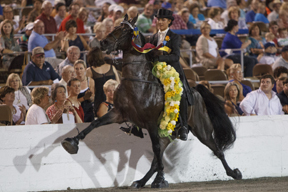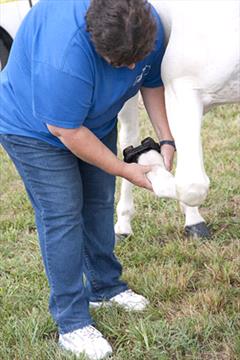Senate could derail six-year effort to eradicate painful horse-training technique

HSUS TWHC 288

Humane Society of the United States photo
A rider demonstrates the "big lick" gait at the Tennessee Walking Horse Celebration in August 2017. The passage of the PAST Act through the House will be the talk of this year’s event, which anti-soring activists say is rife with the use of pain-inducing tactics.
After six years of stalling in committee, legislation to reform the treatment of walking horses made strides today. Members of the U.S. House of Representatives voted 333 to 96 to approve the U.S. Senator Joseph D. Tydings Memorial Prevent All Soring Tactics Act, or the PAST Act.
The legislation aims to improve enforcement of federal laws against soring, which is the practice of inflicting pain on a horse's lower forelegs and feet so that it lifts its legs higher in an attempt to escape the discomfort. The exaggerated gait, known as the "big lick," wins equine show competitions. The bill is endorsed by the American Veterinary Medical Association, the American Association of Equine Practitioners and every state veterinary medical association, as well as many animal welfare organizations and equine groups.
The PAST Act was introduced in January by two veterinarians: Reps. Kurt Schrader, a Democrat from Oregon, and Ted Yoho, a Republican from Florida. Both are large animal veterinarians and they co-chair the Congressional Veterinary Medicine Caucus. During a press conference in Washington, D.C., yesterday, Schrader said, "As a veterinarian with my fellow veterinarian Ted Yoho, we just find it unbelievable that in the 21st century, these practices still continue."
Schrader referred to the bill as common-sense legislation that was long overdue. He added that the walking horse industry had been given 40 years to treat horses humanely, but failed to abolish soring. "Unfortunately ... there are certain elements, not all, but certain elements that this is the only way they think they can train a horse," Schrader said, gesturing to a display of chains and stacked shoes used to sore horses. "I'm here to tell you that good trainers can train a horse to do the big lick without this apparatus."
Opponents, many with strong ties to the walking horse industry, say they abhor the practice of soring but feel the PAST Act goes too far and will destroy the Tennessee walking horse tradition. That perspective is shared by Marsha Blackburn and Lamar Alexander, two Republican senators who could block the bill in the upper chamber.
There are many ways to sore a horse. Unscrupulous trainers apply caustic agents, such as kerosene, to the horse's front pasterns (ankles) to injure the skin and attach chains to irritate the sore area. They might insert sharp objects between shoe pads and the sole of the foot, or grind and trim the hoof or sole to expose sensitive tissue. Sometimes horses are fitted with stacks of pads, forcing them to stand at an unnatural angle.
Some sored horses can recover with rest and rehabilitation. In other cases, the physical and mental damage is irreversible.
Federal anti-soring activity
Although the Horse Protection Act of 1970 (HPA) attempted to eradicate soring, the practice persists due to weak penalties, lax enforcement and the fact that stacks, chains and other devices are still permitted. While opponents of the PAST Act say soring is rare, hundreds of competitors are disqualified for HPA violations at shows every year.
The PAST Act would amend the HPA to:
- make soring a horse illegal (right now, it is only illegal to transport, show or auction a horse that has been sored)
- increase civil and criminal penalties for individuals caught soring
- prohibit the use of "action devices," such as chains that rub up and down already sore forelegs
- allow for the permanent disqualification for three-time offenders
- end self-policing by the walking horse industry by putting inspections in the hands of the U.S. Department of Agriculture, rather than industry.
In addition to Tennessee walking horses, the anti-soring rules would apply to spotted saddle horses, racking horses and other breeds used in competitions focused on gait.
Opportunity knocks
Lawmakers in both chambers have sponsored the PAST Act for each of the three past legislative sessions with broad bipartisan support but struggled to get a vote. Conditions changed in the House this year as a result of political machinations far from the world of show horses.
When Rep. Nancy Pelosi campaigned for House speaker following the 2018 midterm elections, nine Democratic members of the bipartisan Problem Solvers Caucus refused to vote for her unless she agreed to adopt new rules aimed at breaking legislative gridlock. It worked.
As a result, any bill with 290 co-sponsors, or two-thirds of the House, that maintains that support for 25 legislative days, now automatically moves to the House floor for consideration.
Supporters of the PAST Act saw this as an opportunity to finally get their bill out of committee. Schrader, a member of the Problem Solvers Caucus, and Yoho, along with Marty Irby, executive director of Animal Welfare Action, began in January looking for co-sponsors among previous supporters and the House's nearly 100 new members. They hit their goal on May 23. The PAST Act had 307 co-sponsors when it was approved today. The margin was well over the two-thirds requirement to pass.
Adding to the momentum around anti-soring efforts is the attention of the Nashville Metro Council, which votes Aug. 6 on whether to ban the use of weighted shoes, chains, pads and other soring devices within the city limits. While no gaited horse shows occur regularly in the city, the ban could mean some champion walking horses will not be exhibited at the Tennessee State Fair.
Irby, a former world champion Tennessee walking horse rider who has worked from inside and outside the industry to end soring, predicted at the press conference that the bill would pass overwhelmingly. That would "send a strong message to the Senate that says America and the house that is closest to the people will not tolerate this abuse," he said.
But as a realist in the trenches, he told VIN News Service, "I'm not looking through any rose-colored glasses to say this is going to be easy."
What will the Senate do?
Right now, there are two horse-soring bills in the Senate Committee on Commerce, Science and Transportation. One is a companion to the House's PAST Act, S.1007. The other is S.1455, known as the Horse Protection Amendments Act. The latter offers less restrictive anti-soring measures and has been repeatedly introduced as an alternative to the PAST Act. The Senate could also choose instead to vote on the House bill directly.
"I commend the House of Representatives for moving forward on legislation that would end this inhumane and archaic practice once and for all," Sen. Mark Warner, a Democrat from Virginia, said a few days before the vote, "and I urge Leader McConnell to bring our companion legislation up for a vote in the Senate." Warner, who introduced the bill with Sen. Mike Crapo, a Republican from Idaho, is one of 40 co-sponsors.
When asked by the VIN News to gauge the Senate bill's chances, Warner and Crapo declined to speculate.
The track record is not good. The PAST Act has made it out of Senate committee only once in the past three efforts, and there is no consensus calendar in the Senate to push a popular bill to the floor.
USDA soring 288

USDA APHIS photo
A "designated qualified person" inspects a horse prior to competition. The PAST Act would end the practice of self-policing by the walking horse industry and put inspections squarely in the hands of the U.S. Department of Agriculture.
The 2018 midterms also changed the Senate picture in a way that could make the going tougher even than in past years. Blackburn, who had been an outspoken opponent of the PAST Act in the House before she became a senator, continues to push for industry self-policing and to allow for the continued use of pads and chains.
"It may take years to pass it if Marsha Blackburn continues to be an obstructionist," Irby said. "She's the one that's very vocal on it."
Blackburn's office declined to respond to VIN News questions. Blackburn has said the PAST Act "brings excessive regulatory burdens on the walking horse industry and could potentially eliminate the entire industry and thus the entire breed," according to a story in the Huffington Post.
Blackburn is a co-sponsor of the Horse Protection Amendments Act. This legislation would put the appointment of soring inspectors in the hands of the Commissioners of Agriculture in Kentucky and Tennessee, and include inspectors from the Tennessee walking horse industry. It also revises the inspection protocols to address claims of inconsistent inspections and wrongful charges of rule-breaking. The Horse Protection Amendments Act does not ban pads, weighted shoes or chains.
"The Tennessee Walking Horse industry plays a vital role in our state's agricultural economy," Blackburn said in a press release for the bill. "It is time to address the need for common-sense reform to stop the abuse of our beloved Walking Horses and to implement inspection and testing methods to eliminate these problems for good."
In addition to Blackburn and Alexander, the bill's only other co-sponsors are Sen. Rand Paul and the powerful Senate Majority Leader Mitch McConnell, both from Kentucky. (The House version of the bill has 11 co-sponsors, all but one from Kentucky or Tennessee.)
Describing the Horse Protection Amendments Act as "a tactic to confuse people," Irby said it will never go anywhere. But he conceded the PAST Act, though far more popular, has a tough road of its own.
“The only way that we’ll be able to move the bill through the Senate is to have enough overwhelming support that those four senators from Tennessee and Kentucky decide that the majority of Congress, the Senate, and the American people should rule.” Irby said.